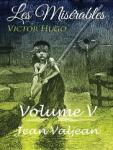
Les Misérables Volume V - Jean Valjean
by Victor Hugo
Valjean arrives at the barricade and immediately saves a man's life. He is still not certain if he wants to protect Marius or kill him. Marius recognizes Valjean at first sight. Enjolras announces that they are almost out of cartridges. When Gavroche goes outside the barricade to collect more ammunition from the dead National Guardsmen, he is shot by the troops.
Valjean volunteers to execute Javert himself, and Enjolras grants permission. Valjean takes Javert out of sight, and then shoots into the air while letting him go. Marius mistakenly believes that Valjean has killed Javert. As the barricade falls, Valjean carries off the injured and unconscious Marius. All the other students are killed. Valjean escapes through the sewers, carrying Marius's body. He evades a police patrol, and reaches an exit gate but finds it locked. Thénardier emerges from the darkness. Valjean recognizes him, but his filthy appearance prevents Thénardier from recognizing him. Thinking Valjean a murderer lugging his victim's corpse, Thénardier offers to open the gate for money. As he searches Valjean and Marius's pockets, he surreptitiously tears off a piece of Marius's coat so he can later find out his identity. Thénardier takes the thirty francs he finds, opens the gate, and allows Valjean to leave, expecting Valjean's emergence from the sewer will distract the police who have been pursuing him.
Upon exiting, Valjean encounters Javert and requests time to return Marius to his family before surrendering to him. Javert agrees, assuming that Marius will be dead within minutes. After leaving Marius at his grandfather's house, Valjean asks to be allowed a brief visit to his own home, and Javert agrees. There, Javert tells Valjean he will wait for him in the street, but when Valjean scans the street from the landing window he finds Javert has gone. Javert walks down the street, realizing that he is caught between his strict belief in the law and the mercy Valjean has shown him. He feels he can no longer give Valjean up to the authorities but also cannot ignore his duty to the law. Unable to cope with this dilemma, Javert commits suicide by throwing himself into the Seine.
Marius slowly recovers from his injuries. As he and Cosette make wedding preparations, Valjean endows them with a fortune of nearly 600,000 francs. As their wedding party winds through Paris during Mardi Gras festivities, Valjean is spotted by Thénardier, who then orders Azelma to follow him. After the wedding, Valjean confesses to Marius that he is an ex-convict. Marius is horrified, assumes the worst about Valjean's moral character, and contrives to limit Valjean's time with Cosette. Valjean accedes to Marius' judgment and his separation from Cosette. Valjean loses the will to live and retires to his bed.
Thénardier approaches Marius in disguise, but Marius recognizes him. Thénardier attempts to blackmail Marius with what he knows of Valjean, but in doing so, he inadvertently corrects Marius's misconceptions about Valjean and reveals all of the good he has done. He tries to convince Marius that Valjean is actually a murderer, and presents the piece of coat he tore off as evidence. Stunned, Marius recognizes the fabric as part of his own coat and realizes that it was Valjean who rescued him from the barricade. Marius pulls out a fistful of notes and flings it at Thénardier's face. He then confronts Thénardier with his crimes and offers him an immense sum to depart and never return. Thénardier accepts the offer, and he and Azelma travel to America where he becomes a slave trader.
As they rush to Valjean's house, Marius tells Cosette that Valjean saved his life at the barricade. They arrive to find Valjean near death and reconcile with him. Valjean tells Cosette her mother's story and name. He dies content and is buried beneath a blank slab in Père Lachaise Cemetery.

Les Misérables Volume IV - Sanit-Denis
by Victor Hugo
After Éponine's release from prison, she finds Marius at "The Field of the Lark" and sadly tells him that she found Cosette's address. She leads him to Valjean's and Cosette's house on Rue Plumet, and Marius watches the house for a few days. He and Cosette then finally meet and declare their love for one another. Thénardier, Patron-Minette and Brujon manage to escape from prison with the aid of Gavroche. One night, during one of Marius's visits with Cosette, the six men attempt to raid Valjean's and Cosette's house. However, Éponine, who has been sitting by the gates of the house, threatens to scream and awaken the whole neighbourhood if the thieves do not leave. Hearing this, they reluctantly retire. Meanwhile, Cosette informs Marius that she and Valjean will be leaving for England in a week's time, which greatly troubles the pair.
The next day, Valjean is sitting in the Champ de Mars. He is feeling troubled about seeing Thénardier in the neighbourhood several times. Unexpectedly, a note lands in his lap, which says "Move Out." He sees a figure running away in the dim light. He goes back to his house, tells Cosette they will be staying at their other house on Rue de l'Homme Arme, and reconfirms to her that they will be moving to England. Marius tries to get permission from M. Gillenormand to marry Cosette. His grandfather seems stern and angry, but has been longing for Marius's return. When tempers flare, he refuses his assent to the marriage, telling Marius to make Cosette his mistress instead. Insulted, Marius leaves.
The following day, the students revolt and erect barricades in the narrow streets of Paris. Gavroche spots Javert and informs Enjolras that Javert is a spy. When Enjolras confronts him about this, he admits his identity and his orders to spy on the students. Enjolras and the other students tie him up to a pole in the Corinth restaurant. Later that evening, Marius goes back to Valjean's and Cosette's house on Rue Plumet, but finds the house no longer occupied. He then hears a voice telling him that his friends are waiting for him at the barricade. Distraught to find Cosette gone, he heeds the voice and goes.
When Marius arrives at the barricade, the "revolution" has already started. When he stoops down to pick up a powder keg, a soldier comes up to shoot Marius. However a man covers the muzzle of the soldier's gun with his hand. The soldier fires, fatally shooting the man, while missing Marius. Meanwhile, the soldiers are closing in. Marius climbs to the top of the barricade, holding a torch in one hand, a powder keg in the other, and threatens to the soldiers that he will blow up the barricade. After confirming this, the soldiers retreat from the barricade.
Marius decides to go to the smaller barricade, which he finds empty. As he turns back, the man who took the fatal shot for Marius earlier calls Marius by his name. Marius discovers this man is Éponine, dressed in men's clothes. As she lies dying on his knees, she confesses that she was the one who told him to go to the barricade, hoping they would die together. She also confesses to saving his life because she wanted to die before he did.
The author also states to the reader that Éponine anonymously threw the note to Valjean. Éponine then tells Marius that she has a letter for him. She also confesses to have obtained the letter the day before, originally not planning to give it to him, but decides to do so in fear he would be angry at her about it in the afterlife. After Marius takes the letter, Éponine then asks him to kiss her on the forehead when she is dead, which he promises to do. With her last breath, she confesses that she was "a little bit in love" with him, and dies.
Marius fulfills her request and goes into a tavern to read the letter. It is written by Cosette. He learns Cosette's whereabouts and he writes a farewell letter to her. He sends Gavroche to deliver it to her, but Gavroche leaves it with Valjean. Valjean, learning that Cosette's lover is fighting, is at first relieved, but an hour later, he puts on a National Guard uniform, arms himself with a gun and ammunition, and leaves his home.
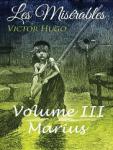
Les Misérables Volume III - Marius
by Victor Hugo
Eight years later, the Friends of the ABC, led by Enjolras, are preparing an act of anti-Orléanist civil unrest on the eve of the Paris uprising on 5–6 June 1832, following the death of General Lamarque, the only French leader who had sympathy towards the working class. They are also joined by the poor of the Cour des miracles, including the Thénardiers' eldest son Gavroche, who is a street urchin.
One of the students, Marius Pontmercy, has become alienated from his family (especially his grandfather M. Gillenormand) because of his liberal views. After the death of his father Colonel Georges Pontmercy, Marius discovers a note from him instructing his son to provide help to a sergeant named Thénardier who saved Pontmercy's life at Waterloo – in reality Thénardier was looting corpses and only saved Pontmercy's life by accident; he had called himself a sergeant under Napoleon to avoid exposing himself as a robber.
At the Luxembourg Gardens, Marius falls in love with the now grown and beautiful Cosette. The Thénardiers have also moved to Paris and now live in poverty after losing their inn. They live under the surname "Jondrette" at Gorbeau House (coincidentally, the same building Valjean and Cosette briefly lived in after leaving the Thénardiers' inn). Marius lives there as well, next door to the Thénardiers.
Éponine, now ragged and emaciated, visits Marius at his apartment to beg for money. To impress him, she tries to prove her literacy by reading aloud from a book and by writing "The Cops Are Here" on a sheet of paper. Marius pities her and gives her some money. After Éponine leaves, Marius observes the "Jondrettes" in their apartment through a crack in the wall. Éponine comes in and announces that a philanthropist and his daughter are arriving to visit them. In order to look poorer, Thénardier puts out the fire and breaks a chair. He also orders Azelma to punch out a window pane, which she does, resulting in cutting her hand (as Thénardier had hoped).
The philanthropist and his daughter enter—actually Valjean and Cosette. Marius immediately recognizes Cosette. After seeing them, Valjean promises them he will return with rent money for them. After he and Cosette leave, Marius asks Éponine to retrieve her address for him. Éponine, who is in love with Marius herself, reluctantly agrees to do so. The Thénardiers have also recognized Valjean and Cosette, and vow their revenge. Thénardier enlists the aid of the Patron-Minette, a well-known and feared gang of murderers and robbers.
Marius overhears Thénardier's plan and goes to Javert to report the crime. Javert gives Marius two pistols and instructs him to fire one into the air if things get dangerous. Marius returns home and waits for Javert and the police to arrive. Thénardier sends Éponine and Azelma outside to look out for the police. When Valjean returns with rent money, Thénardier, with Patron-Minette, ambushes him and he reveals his real identity to Valjean. Marius recognizes Thénardier as the man who "saved" his father's life at Waterloo and is caught in a dilemma.
He tries to find a way to save Valjean while not betraying Thénardier. Valjean denies knowing Thénardier and tells him that they have never met. Valjean tries to escape through a window but is subdued and tied up. Thénardier orders Valjean to pay him 200,000 francs. He also orders Valjean to write a letter to Cosette to return to the apartment, and they would keep her with them until he delivers the money. After Valjean writes the letter and informs Thénardier of his address, Thénardier sends out Mme. Thénardier to get Cosette. Mme. Thénardier comes back alone, and announces the address is a fake.
It is during this time that Valjean manages to free himself. Thénardier decides to kill Valjean. While he and Patron-Minette are about to do so, Marius remembers the scrap of paper that Éponine wrote on earlier. He throws it into the Thénardiers' apartment through the wall crack. Thénardier reads it and thinks Éponine threw it inside. He, Mme. Thénardier and Patron-Minette try to escape, only to be stopped by Javert.
He arrests all the Thénardiers and Patron-Minette (except Claquesous, who escapes during his transportation to prison; Montparnasse, who stops to run off with Éponine instead of joining in on the robbery; and Gavroche, who was not present and rarely participates in his family's crimes, a notable exception being his part in breaking his father out of prison). Valjean manages to escape the scene before Javert sees him.
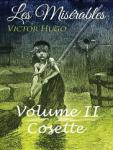
Les Misérables Volume II - Cosette
by Victor Hugo
Valjean escapes, is recaptured, and is sentenced to death. The king commutes his sentence to penal servitude for life. While imprisoned at the military port of Toulon, Valjean, at great personal risk, rescues a sailor caught in the ship's rigging. Spectators call for his release. Valjean fakes his own death by allowing himself to fall into the ocean. Authorities report him dead and his body lost.
Valjean arrives at Montfermeil on Christmas Eve. He finds Cosette fetching water in the woods alone and walks with her to the inn. He orders a meal and observes how the Thénardiers abuse her, while pampering their own daughters Éponine and Azelma, who mistreat Cosette for playing with their doll. Valjean leaves and returns to make Cosette a present of an expensive new doll which, after some hesitation, she happily accepts. Éponine and Azelma are envious. Madame Thénardier is furious with Valjean, while her husband makes light of Valjean's behaviour, caring only that he pay for his food and lodging.
The next morning, Valjean informs the Thénardiers that he wants to take Cosette with him. Madame Thénardier immediately accepts, while Thénardier pretends to love Cosette and be concerned for her welfare, reluctant to give her up. Valjean pays 1,500 francs to them, and he and Cosette leave the inn. Thénardier, hoping to swindle more out of Valjean, runs after them, holding the 1,500 francs, and tells Valjean he wants Cosette back. He informs Valjean that he cannot release Cosette without a note from the child's mother. Valjean hands Thénardier Fantine's letter authorizing the bearer to take Cosette. Thénardier then demands that Valjean pay a thousand crowns, but Valjean and Cosette leave. Thénardier regrets that he did not bring his gun and turns back toward home.
Valjean and Cosette flee to Paris. Valjean rents new lodgings at Gorbeau House, where he and Cosette live happily. However, Javert discovers Valjean's lodgings there a few months later. Valjean takes Cosette and they try to escape from Javert. They soon find shelter in the Petit-Picpus convent with the help of Fauchelevent, the man whom Valjean once rescued from being crushed under a cart and who has become the convent's gardener. Valjean also becomes a gardener and Cosette becomes a student at the convent school.
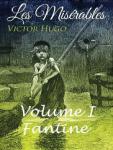
Les Misérables Volume I - Fantine
by Victor Hugo
The story begins in 1815 in Digne, as the peasant Jean Valjean, just released from 19 years' imprisonment in the galleys—five for stealing bread for his starving sister and her family and fourteen more for numerous escape attempts—is turned away by innkeepers because his yellow passport marks him as a former convict. He sleeps on the street, angry and bitter.
Digne's benevolent Bishop Myriel gives him shelter. At night, Valjean runs off with Myriel's silverware. When the police capture Valjean, Myriel pretends that he has given the silverware to Valjean and presses him to take two silver candlesticks as well, as if he had forgotten to take them. The police accept his explanation and leave. Myriel tells Valjean that his life has been spared for God, that he should use the silver candlesticks to make an honest man of himself.
Valjean broods over Myriel's words. When opportunity presents itself, purely out of habit, he steals a 40-sous coin from 12-year-old Petit Gervais and chases the boy away. He quickly repents and searches the city in panic for Gervais. At the same time, his theft is reported to the authorities. Valjean hides as they search for him, because if apprehended he will be returned to the galleys for life as a repeat offender.
Six years pass and Valjean, using the alias Monsieur Madeleine, has become a wealthy factory owner and is appointed mayor of a town identified only as M____-sur-M__. Walking down the street, he sees a man named Fauchelevent pinned under the wheels of a cart. When no one volunteers to lift the cart, even for pay, he decides to rescue Fauchelevent himself. He crawls underneath the cart, manages to lift it, and frees him. The town's police inspector, Inspector Javert, who was an adjutant guard at the Bagne of Toulon during Valjean's incarceration, becomes suspicious of the mayor after witnessing this remarkable feat of strength. He has known only one other man, a convict named Jean Valjean, who could accomplish it.
Years earlier in Paris, a grisette named Fantine was very much in love with Félix Tholomyès. His friends, Listolier, Fameuil, and Blachevelle were also paired with Fantine's friends Dahlia, Zéphine, and Favourite. The men abandon the women, treating their relationships as youthful amusements. Fantine must draw on her own resources to care for hers and Tholomyès's daughter, Cosette. When Fantine arrives at Montfermeil, she leaves Cosette in the care of the Thénardiers, a corrupt innkeeper and his selfish, cruel wife.
Fantine is unaware that they are abusing her daughter and using her as forced labor for their inn, and continues to try to meet their growing, extortionate and fictitious demands. She is later fired from her job at Jean Valjean's factory, because of the discovery of her daughter, who was born out of wedlock. Meanwhile, the Thénardiers' monetary demands continue to grow. In desperation, Fantine sells her hair and two front teeth, and she resorts to prostitution to pay the Thénardiers. Fantine is slowly dying from an unspecified disease.
A dandy named Bamatabois harasses Fantine in the street, and she reacts by striking him. Javert arrests Fantine. She begs to be released so that she can provide for her daughter, but Javert sentences her to six months in prison. Valjean (Mayor Madeleine) intervenes and orders Javert to release her. Javert resists but Valjean prevails. Valjean, feeling responsible because his factory turned her away, promises Fantine that he will bring Cosette to her. He takes her to a hospital.
Javert comes to see Valjean again. Javert admits that after being forced to free Fantine, he reported him as Valjean to the French authorities. He tells Valjean he realizes he was wrong, because the authorities have identified someone else as the real Jean Valjean, have him in custody, and plan to try him the next day. Valjean is torn, but decides to reveal himself to save the innocent man, whose real name is Champmathieu. He travels to attend the trial and there reveals his true identity. Valjean returns to M____-sur-M__ to see Fantine, followed by Javert, who confronts him in her hospital room.
After Javert grabs Valjean, Valjean asks for three days to bring Cosette to Fantine, but Javert refuses. Fantine discovers that Cosette is not at the hospital and fretfully asks where she is. Javert orders her to be quiet, and then reveals to her Valjean's real identity. Weakened by the severity of her illness, she falls back in shock and dies. Valjean goes to Fantine, speaks to her in an inaudible whisper, kisses her hand, and then leaves with Javert. Fantine's body is thrown into a public grave.
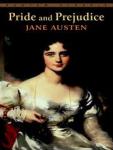
Pride and Prejudice
by Jane Austen
The novel centers on the Bennet family, consisting of the bookish Mr Bennet, his wife, a woman somewhat lacking in social graces and primarily concerned with her family's fortunes, and their five daughters. The youngest, Lydia, most takes after Mrs Bennet; the eldest, Jane, is kind-hearted and proper; and the central character, Elizabeth Bennet, is the second-eldest and most takes after her father, sharing his keen wit and occasionally sarcastic outlook.
The narrative opens with Mr Bingley's, a wealthy, charismatic and social young bachelor, moving into Netherfield Park in the neighbourhood of the Bennet family. Mr Bingley is soon well received, while his friend Mr Darcy makes a less favorable first impression by appearing proud and condescending at a ball that they attend (he detests dancing and is not much for light conversation). Mr Bingley singles out Jane for particular attention, and it soon becomes apparent that they have formed an attachment to each other, though Jane does not alter her conduct for him, confessing her great happiness only to Lizzie. By contrast, Darcy slights Elizabeth, who overhears and jokes about it despite feeling a budding resentment.
On paying a visit to Mr Bingley's sister, Caroline, Jane is caught in a heavy downpour, catches cold, and is forced to stay at Netherfield for several days. Elizabeth arrives to nurse her sister and is thrown into frequent company with Mr Darcy, who begins to act marginally less coldly towards her.
Mr Collins, a clergyman, pays a visit to the Bennets. Mr Bennet and Elizabeth are much amused by his obsequious veneration of his employer, the noble Lady Catherine de Bourgh, as well as by his self-important and pedantic nature. It soon becomes apparent that Mr Collins has come to Longbourn to choose a wife from among the Bennet sisters (his cousins) and Elizabeth has been singled out. At the same time, Elizabeth forms an acquaintance with Mr Wickham, a militia officer who claims to have been very seriously mistreated by Mr Darcy, despite having been a ward of Mr Darcy's father. This tale, and Elizabeth's attraction to Mr Wickham, fuels her dislike of Mr Darcy.
At a ball given by Mr Bingley at Netherfield, Mr Darcy becomes aware of a general expectation that Mr Bingley and Jane will marry, and the Bennet family, with the exception of Jane and Elizabeth, make a public display of poor manners and decorum. The following morning, Mr Collins proposes marriage to Elizabeth, who refuses him, much to her mother's distress. Mr Collins recovers and promptly becomes engaged to Elizabeth's close friend Charlotte, a homely woman with few prospects. Mr Bingley abruptly quits Netherfield and returns to London, devastating Jane, and Elizabeth becomes convinced that Mr Darcy and Caroline Bingley have colluded to separate him from Jane.
In the spring, Elizabeth visits Charlotte and Mr Collins in Kent. Elizabeth and her hosts are frequently invited to Rosings Park, home of Lady Catherine de Bourgh, Darcy's aunt; coincidentally, Darcy also arrives to visit. Elizabeth meets Darcy's cousin, Colonel Fitzwilliam, who vouches for Darcy's loyalty, using as an example how Darcy had recently stepped in on behalf of a friend, who had formed an attachment to a woman against whom "there were some very strong objections." Elizabeth is astonished to discover that said friend was none other than Mr Bingley, and her dislike of Darcy hardens further. Thus she is of no mood to accept when Darcy arrives and, quite unexpectedly, confesses love for her and begs her hand in marriage. Elizabeth rebukes him, and a heated discussion follows; she charges him with destroying her sister's happiness, with treating Mr Wickham disgracefully, and with having conducted himself towards her in an arrogant, ungentleman-like manner. Mr Darcy, shocked, ultimately responds with a letter giving a good account of (most of) his actions: Wickham had exchanged his legacies for a cash payment, only to return after gambling away the money to reclaim the forfeited inheritance; he then attempted to elope with Darcy's young sister Georgiana, thereby to capture her fortune. Regarding Jane, Darcy claims he had observed no reciprocal interest in Jane for Bingley, and had assumed her not to be in love with him. In addition to this, he cites the "want of propriety" in the behaviour of Mrs Bennet and her three younger daughters. Elizabeth, who had previously despaired over these very behaviors, is forced to admit the truth of Mr Darcy's observations, and begins to wonder whether she has misjudged him.
Some months later, Elizabeth and her Aunt and Uncle Gardiner visit Pemberley, Darcy's estate, believing he will be absent for the day. He returns unexpectedly, and though surprised, he is gracious and welcoming. He treats the Gardiners with great civility. Darcy introduces Elizabeth to his sister, and Elizabeth begins to realize her attraction to him. Their reacquaintance is cut short, however, by the news that Lydia has run away with Mr Wickham. Elizabeth and the Gardiners return to Longbourn, where Elizabeth grieves that her renewed acquaintance with Mr Darcy will end as a result of her sister's disgrace.
Lydia and Wickham are soon found, then married by the clergy; they visit Longbourn, where Lydia lets slip that Mr Darcy was in attendance at her wedding but that this was to have been a secret. Elizabeth is able to discover, from her Aunt Mrs. Gardiner, that in fact Mr. Darcy was responsible for finding the couple and negotiating their marriage, at great personal and monetary expense. Elizabeth is shocked but is unable to dwell further on the topic due to Mr Bingley's return and subsequent proposal to Jane, who immediately accepts.
Lady Catherine de Bourgh later bursts in on Longbourn; intending to thwart local rumour, she warns Elizabeth against marrying Mr Darcy. Elizabeth refuses her demands. Disgusted, Lady Catherine leaves and drops by to inform her nephew on Elizabeth's abominable behaviour. However, this lends hope to Darcy that Elizabeth's opinion of him may have changed. He travels to Longbourn and proposes again, and this time, his pride and her prejudice done away with, Elizabeth accepts.

Romola
by George Eliot
Florence, 1492: Christopher Columbus has sailed towards the New World, and Florence has just mourned the death of its legendary leader, Lorenzo de' Medici. In this setting, a Florentine trader meets a shipwrecked stranger, who introduces himself as Tito Melema, a young Italianate-Greek scholar. Tito becomes acquainted with several other Florentines, including Nello the barber and a young girl named Tessa. He is also introduced to a blind scholar named Bardo de' Bardi, and his daughter Romola. As Tito becomes settled in Florence, assisting Bardo with classical studies, he falls in love with Romola. However, Tessa falls in love with Tito, and the two are "married" in a mock ceremony.
Tito learns from Fra Luca, a Dominican monk, that his adoptive father has been forced into slavery and is asking for assistance. Tito introspects, comparing filial duty to his new ambitions in Florence, and decides that it would be futile to attempt to rescue his adoptive father. This paves the way for Romola and Tito to marry. Fra Luca shortly thereafter falls ill and before his death he speaks to his estranged sister, Romola. Ignorant of Romola's plans, Fra Luca warns her of a vision foretelling a marriage between her and a mysterious stranger who will bring pain to her and her father. After Fra Luca's death, Tito dismisses the warning and advises Romola to trust him. Tito and Romola become betrothed at the end of Carnival, to be married at Easter after Tito returns from a visit to Rome.
The novel then skips ahead to November 1494, more than eighteen months after the marriage. In that time, the French-Italian Wars have seen Florence enter uneasy times. Piero de' Medici, successor to the lordship of Florence, has been exiled from the city for his ignominious surrender to the invading French king, Charles VIII. Girolamo Savonarola preaches to Florentines about ridding the Church and the city of scourge and corruption. In this setting, Tito, now a valued member of Florentine society, participates in the reception for the French invaders. Tito encounters an escaped prisoner, who turns out to be his adopted father, Baldassare. Panicked and somewhat ashamed of his earlier inaction, Tito denies knowing the escaped prisoner and calls him a madman. Baldassare escapes into the Duomo, where he swears revenge on his unfilial adoptive son. Growing ever more fearful, Tito plans to leave Florence. To do this, he betrays his late father-in-law, Bardo, who died some months earlier, by selling the late scholar's library. This reveals to Romola the true nature of her husband's character. She secretly leaves Tito and Florence, but is persuaded by Savonarola to return to fulfil her obligations to her marriage and her fellow Florentines. Nevertheless, the love between Romola and Tito has gone.
Again the action of the novel moves forward, from Christmas 1494 to October 1496. In that time, Florence has endured political upheaval, warfare and famine. Religious fervour has swept through Florence under the leadership of Savonarola, culminating in the Bonfire of the Vanities. The League of Venice has declared war on the French king and his Italian ally, Florence. Starvation and disease run rampant through the city. Romola, now a supporter of Savonarola, helps the poor and sick where she can. Meanwhile, Tito is embroiled in a complex game of political manoeuvring and duplicitous allegiances in the new Florentine government. Mirroring this, he has escaped attempts by Baldassare to both kill and expose him, and maintains a secret marriage to Tessa, with whom he has fathered two children. Romola becomes defiant of Tito, and the two manoeuvre to thwart each other's plans. Romola meets an enfeebled Baldassare, who reveals Tito's past and leads her to Tessa.
Political turmoil erupts in Florence. Five supporters of the Medici family are sentenced to death, including Romola's godfather, Bernardo del Nero. She learns that Tito has played a role in their arrest. Romola pleads with Savonarola to intervene, but he refuses. Romola's faith in Savonarola and Florence is shaken, and once again she leaves the city. Meanwhile, Florence is under papal pressure to expel Savonarola. His arrest is effected by rioters, who then turn their attention to several of the city's political elite. Tito becomes a target of the rioters, but he escapes the mob by diving into the Arno River. However, upon leaving the river, Tito is killed by Baldassare.
Romola makes her way to the coast. Emulating Gostanza in Boccacio's The Decameron (V, 2), she drifts out to sea in a small boat to die. However, the boat takes her to a small village affected by the Plague, and she helps the survivors. Romola's experience gives her a new purpose in life and she returns to Florence. Savonarola is tried for heresy and burned at the stake, but for Romola his influence remains inspiring. Romola takes care of Tessa and her two children, with the help of her older cousin. The story ends with Romola imparting advice to Tessa's son, based on her own experiences and the influences in her life.

Felix Holt,the Radical
by George Eliot
This is a social novel written by George Eliot about political disputes in a small English town at the time of the First Reform Act of 1832.
As the story starts, the reader is introduced to the fictitious community of Treby in the English Midlands in 1832, around the time of the First Reform Act. Harold Transome, a local landowner, has returned home after a fifteen-year trading career in the Far East. Wealthy from trade, he stands for election to Parliament from the county seat of North Loamshire. But contrary to his family's Tory traditions, he intends to stand as a Radical. This alienates him from his traditional allies and causes despair for his mother, Mrs. Transome. Harold Transome gains the support of his Tory uncle, the Rector of Little Treby, and enlists the help of his family lawyer, Matthew Jermyn, as an electioneering agent.
Much of his electioneering is focused in Treby Magna. In this village resides Felix Holt, who has recently returned from extensive travels in Glasgow to live with his mother. He meets with Rev. Rufus Lyon, a Dissenting minister in Treby Magna, and his stepdaughter, Esther. Felix and Mr. Lyon become ready friends, but he appears to treat Esther with condescension. Felix and Rev. Lyon both appear aligned to the Radical cause.
Harold Transome learns that Jermyn has been mismanaging the Transome estate and embezzling money for himself. Transome remains silent during the election, yet Jermyn tries to devise a plan to save himself from future prosecution. Meanwhile, Felix witnesses some electioneering for the Radical cause in the nearby mining town of Sproxton. He is upset with the 'treating' of workers with beer in exchange for their vocal support. Felix relays his concerns to Harold Transome, who chastises John Johnson for his electioneering methods. However, Jermyn convinces Transome not to interfere.
Rev. Lyon learns from Maurice Christian, servant of Philip Debarry, about the possible identity of Esther's biological father. Rev. Lyon decides to tell Esther the truth about her father. Esther's outlook on life changes upon finding that she is in fact Rev. Lyon's stepdaughter. Her relationship with her stepfather deepens, while she also desires to emulate the high moral standards impressed upon her by Felix Holt. Seeing the change in Esther's character, Felix Holt begins to fall in love with her. However, both share the feeling that they are destined never to marry each other. Meanwhile, Rev. Lyon challenges Rev. Augustus Debarry to a theological debate. The debate is initially agreed to, but is cancelled at the last minute.
Riots erupt on election day in Treby Magna. Drunken mine workers from Sproxton assault townspeople and wantonly destroy property. Felix Holt is caught up in the riots, and tries foolhardily to direct its hostility away from the town. But in the end, Felix Holt is charged with the manslaughter of a constable who tried to break up the riot. Harold Transome also loses the election to Debarry.
Harold Transome begins legal proceedings against Jermyn for the latter's mismanagement of the Transome estate. Jermyn counters by threatening to publicise the true owner of the Transome estate. However, Maurice Christian informs the Transomes that the true owner of the estate is in fact Esther Lyon. Harold Transome invites her to the Transome estate, hoping to persuade her to marry him. Harold and Esther establish a good rapport, and Esther also becomes more sympathetic with Mrs. Transome, whose despair has continued to deepen. Esther feels torn between Harold Transome and Felix Holt. She compares a life of comfortable wealth with Harold Transome and motherly affection with Mrs. Transome, to a life of personal growth in poverty with Felix Holt. Meanwhile at Felix Holt's trial, Rev. Lyon, Harold Transome and Esther Lyon all vouch for his character, but he is nevertheless found guilty of manslaughter. However, Harold Transome and the Debarrys manage to have Felix Holt pardoned.
Harold Transome proposes to Esther Lyon, with the eager support of Mrs. Transome. But despite Esther's feelings towards both Harold and Mrs. Transome, she declines the proposal. In an altercation between Jermyn and Harold Transome, it is revealed that Jermyn is Harold Transome's father. Harold considers he will no longer be suitable for marriage to Esther. Esther also surrenders her claim to the Transome estate. The story ends with Felix Holt and Esther Lyon marrying and moving away from Treby, along with Rev. Lyon. Matthew Jermyn is eventually ruined and moves abroad, while John Johnson remains and prospers as a lawyer. The Debarrys remain friends with the Transomes, and the contest to the Transome estate, while widely known, is never discussed.
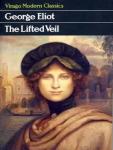
The Lifted Veil
by George Eliot
This book is a novella by George Eliot, first published in 1859. Quite unlike the realistic fiction for which Eliot is best known, The Lifted Veil explores themes of extrasensory perception, the essence of physical life, possible life after death, and the power of fate.
The unreliable narrator, Latimer, believes that he is cursed with an otherworldly ability to see into the future and the thoughts of other people. His unwanted "gift" seems to stem from a severe childhood illness he suffered while attending school in Geneva. Latimer is convinced of the existence of this power, and his two initial predictions do come true the way he has envisioned them: a peculiar "patch of rainbow light on the pavement" and a few words of dialogue appear to him exactly as expected. Latimer is revolted by much of what he discerns about others' motivations.
Latimer becomes fascinated with Bertha, his brother's cold and coquettish fiancée, because her mind and motives remain atypically closed to him. After his brother's death, Latimer marries Bertha, but the marriage disintegrates as he recognizes Bertha's manipulative and untrustworthy nature. Latimer's friend, scientist Charles Meunier, performs a blood transfusion from himself to Bertha's recently deceased maid. For a few moments the maid comes back to life and accuses Bertha of a plot to poison Latimer. Bertha flees and Latimer soon dies as he had himself foretold at the start of the narrative.

Daniel Deronda
by George Eliot
This is a novel by George Eliot, first published in 1876. It was the last novel she completed and the only one set in the contemporary Victorian society of her day. Its mixture of social satire and moral searching, along with a sympathetic rendering of Jewish proto-Zionist and Kabbalistic ideas has made it a controversial final statement of one of the greatest of Victorian novelists.
Daniel Deronda contains two main strains of plot, united by the title character. The novel begins in mid-story in late August 1865 with the meeting of Daniel Deronda and Gwendolen Harleth in the fictional town of Leubronn, Germany. Daniel finds himself attracted to, but wary of, the beautiful, stubborn, and selfish Gwendolen, whom he sees lose all her winnings in a game of roulette. The next day, Gwendolen receives a letter from her mother telling her that the family is financially ruined and asking her to come home. In despair at losing all her money, Gwendolen pawns a necklace and debates gambling again in order to make her fortune. In a fateful moment, however, her necklace is returned to her by a porter, and she realises that Daniel saw her pawn the necklace and redeemed it for her. From this point, the plot breaks off into two separate flashbacks, one which gives us the history of Gwendolen Harleth and one of Daniel Deronda.
In October 1864, soon after the death of Gwendolen's stepfather, Gwendolen and her family move to a new neighbourhood. It is here that she meets Henleigh Mallinger Grandcourt, a taciturn and calculating man, who proposes marriage shortly after their first meeting. At first open to his advances, she eventually flees (to the German town in which she meets Deronda) upon discovering that he has several children with his mistress, Lydia Glasher. This portion of the novel sets Gwendolen up as a haughty, selfish, yet affectionate daughter, admired for her beauty but suspected by many in society because of her satirical observations and somewhat manipulative behaviour. She is also prone to fits of terror that shake her otherwise calm and controlling exterior.
Deronda has been raised by a wealthy gentleman, Sir Hugo Mallinger. Deronda's relationship to Sir Hugo is ambiguous and it is widely believed, even by Deronda, that he is Sir Hugo's illegitimate son, though no one is certain. Deronda is an intelligent, light-hearted and compassionate young man who cannot quite decide what to do with his life, and this is a sore point between him and Sir Hugo, who wants him to go into politics. One day in late July 1864, as he is boating on the Thames, Deronda rescues a young Jewish woman, Mirah Lapidoth, from attempting to drown herself. He takes her to the home of friends of his, and it is discovered that Mirah is a singer. She has come to London to search for her mother and brother after running away from her father, who kidnapped her when she was a child and forced her into an acting troupe. She ran away from him finally because she feared he was planning to sell her into an immoral relationship with a friend of his. Moved by her tale, Deronda undertakes to help her look for her mother (who turns out to have died years earlier) and brother and through this, he is introduced to London's Jewish community. Mirah and Daniel grow closer and Daniel, anxious about his growing affection for her, leaves for a short time to join Sir Hugo in Leubronn, where he and Gwendolen first meet.
From here, the story picks up in "real time," and Gwendolen returns from Germany in early September 1865 because her family has lost its fortune in an economic downturn. Gwendolen, having an antipathy to marriage, the only respectable way in which a woman could achieve financial security, attempts to avoid working as a governess by pursuing a career in singing or on the stage, but a prominent musician tells her she does not have the talent. In order to save herself and her family from relative poverty, she marries the wealthy Grandcourt, whom she believes she can manipulate to maintain her freedom to do what she likes, despite having promised Mrs. Glasher she would not marry him and fearing that it is a mistake.
Deronda, searching for Mirah's family, meets a consumptive visionary named Mordecai. Mordecai passionately proclaims his wish that the Jewish people retain their national identity and one day be restored to their Promised Land. Because he is dying, he wants Daniel to become his intellectual heir and continue to pursue his dream and be an advocate for the Jewish people. In spite of being strongly drawn to Mordecai, Deronda hesitates to commit himself to a cause that seems to have no connection to his own identity. Deronda's desire to embrace Mordecai's vision becomes stronger when they discover Mordecai is the brother Mirah has known by the name Ezra and has been seeking. Still, Deronda is not a Jew and cannot reconcile this fact with his affection and respect for Mordecai/Ezra, which would be necessary for him to pursue a life of Jewish advocacy.
Gwendolen, meanwhile, has been emotionally crushed by her cold, self-centered, and manipulative husband. She is consumed with guilt for disinheriting Lydia Glasher's children by marrying their father. On Gwendolen's wedding day, Mrs. Glasher cursed her and told her she would suffer for her treachery, which only exacerbates Gwendolen's feelings of dread and terror. During this time, Gwendolen and Deronda meet regularly, and Gwendolen pours out her troubles to him whenever they meet. During a trip to Italy, Grandcourt is knocked from his boat into the water and drowns. Gwendolen, who was present, is consumed with guilt because she had long wished he would die, although after some hesitation she jumped into the Mediterranean in a futile attempt to save him. Deronda, also in Italy to meet his Jewish mother (whose identity Sir Hugo has finally revealed), comforts Gwendolen and advises her. In love with Deronda, Gwendolen hopes for a future with him, but he urges her onto a path of righteousness in which she will help others in order to alleviate her suffering.
Deronda meets his mother and learns that she was a famous opera singer with whom Sir Hugo was once in love. She tells him that her father, a physician and strictly pious Jew, forced her to marry her cousin whom she did not love, despite her resentment of the rigid piety of her childhood. Daniel was the only child of that union, and on her husband's death, she asked the devoted Sir Hugo to raise her son as an English gentleman, never to know that he was Jewish. Upon learning of his true origins, Deronda finally feels comfortable with his love for Mirah, and on his return to England in October 1866, he tells Mirah of his love for her. Daniel commits himself to be Ezra/Mordecai's disciple, and shortly after Deronda's marriage, Ezra/Mordecai dies with Daniel and Mirah at his side. Before Daniel marries Mirah, he goes to Gwendolen to tell her about his origins, his decision to go to "the East" (per Ezra/Mordecai's wish), and his betrothal to Mirah. Gwendolen is devastated by the news, but it becomes a turning point in her life, inspiring her to finally say, "I shall live." She sends him a letter on his wedding day, telling him not to think of her with sadness but to know that she will be a better person for having known him. The newly-weds are all prepared to set off for "the East", with Mordecai, when Mordecai dies in their arms, and the novel ends.

The Essays of
by George Eliot
A selection of George Eliot's essays collected, arranged and with an introduction by Nathan Sheppard. First published in 1883.
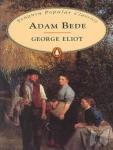
Adam Bede
by George Eliot
The first novel written by George Eliot (the pen name of Mary Ann Evans), was published in 1859. It was published pseudonymously, even though Evans was a well-published and highly respected scholar of her time. The novel has remained in print ever since, and is used in university studies of 19th century English literature.
The story's plot follows four characters' rural lives in the fictional community of Hayslope—a rural, pastoral and close-knit community in 1799. The novel revolves around a love "rectangle" between beautiful but self-absorbed Hetty Sorrel, Captain Arthur Donnithorne, the young squire who seduces her, Adam Bede, her unacknowledged suitor, and Dinah Morris, Hetty's cousin, a fervent, virtuous and beautiful Methodist lay preacher. (The real village where Adam Bede was set is Ellastone on the Staffordshire / Derbyshire border, a few miles from Uttoxeter and Ashbourne, and near to Alton Towers. Eliot's father lived in the village as a carpenter in a substantial house now known as Adam Bede's Cottage).
Adam is a local carpenter much admired for his integrity and intelligence, in love with Hetty. She is attracted to Arthur, the charming local squire's grandson and heir, and falls in love with him. When Adam interrupts a tryst between them, Adam and Arthur fight. Arthur agrees to give up Hetty and leaves Hayslope to return to his militia. After he leaves, Hetty Sorrel agrees to marry Adam but shortly before their marriage, discovers she is pregnant. In desperation, she leaves in search of Arthur. She cannot find him; unwilling to return to the village on account of the shame and ostracism she would have to endure, she delivers her baby with the assistance of a friendly woman she encounters. Later, the child is killed when she abandons it in a field. Not being able to bear the child's cries she tries to come back but she is too late when she finds out that it dies of exposure.
Hetty is caught and tried for child murder. She is found guilty and sentenced to hang. Dinah enters the prison and pledges to stay with Hetty until the end. Her compassion brings about Hetty's contrite confession. When Arthur Donnithorne, on leave from the militia for his grandfather's funeral, hears of her impending execution, he races to the court and has the sentence commuted to transportation.
Ultimately, Adam and Dinah, who gradually become aware of their mutual love, marry and live peacefully with his family.
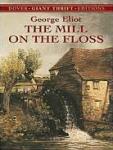
The Mill on the Floss
by George Eliot
This is a novel by George Eliot (Mary Ann Evans), first published in three volumes in 1860 by William Blackwood.
The novel details the lives of Tom and Maggie Tulliver, a brother and sister growing up at Dorlcote Mill on the River Floss at its junction with the more minor River Ripple near the village of St. Ogg's in Lincolnshire, England. Both the river and the village are fictional. The novel is most probably set in the 1820s - a number of historical references place the events in the book after the Napoleonic Wars but before the Reform Act of 1832.
The novel spans a period of 10 to 15 years, from Tom’s and Maggie’s childhood up until their deaths in a flood on the Floss. The book is fictional autobiography in part, reflecting the disgrace that George Eliot (Mary Ann Evans) herself experienced while in a lengthy relationship with a married man, George Henry Lewes.
Maggie Tulliver holds the central role in the book. The story begins when she is 9 years old, 13 years into her parent's marriage. Her relationship with her older brother Tom, and her romantic relationships with Philip Wakem, a hunchbacked, sensitive, and intellectual friend, and with Stephen Guest, a vivacious young socialite in St. Ogg's and assumed fiancé of Maggie’s cousin Lucy Deane, constitute the most significant narrative threads.
Tom and Maggie have a close yet complex bond, which continues throughout the novel. Their relationship is coloured by Maggie's desire to recapture the unconditional love her father provides before his death. Tom’s pragmatic and reserved nature clashes with Maggie’s idealism and fervor for intellectual gains and experience. Various family crises, including bankruptcy, Mr. Tulliver’s rancorous relationship with Philip Wakem’s father, which results in the loss of the mill, and Mr. Tulliver’s untimely death, serve both to intensify Tom’s and Maggie’s differences and to highlight their love for each other. To help his father repay his debts, Tom leaves his school to enter a life of business. He eventually finds a measure of success, restoring the family’s former estate. Meanwhile Maggie languishes in the impoverished Tulliver home, her intellectual aptitude wasted in her socially isolated state. She passes through a period of intense spirituality, during which she renounces the world, spurred by Thomas à Kempis’s The Imitation of Christ.
This renunciation is tested by a renewed friendship with Philip Wakem, with whom she had developed a friendship while he was a fellow pupil with Tom. Against the wishes of Tom and her father, who both despise the Wakems, Maggie secretly meets with Philip, and together they go for long walks through the woods. The relationship they forge is founded partially in Maggie’s heartfelt pity for broken and neglected human beings, as well as an outlet for her intellectual romantic desires. Philip’s and Maggie’s attraction is, in any case, inconsequential because of the family antipathy. Philip manages to coax a pledge of love from Maggie. When Tom discovers the relationship between the two, however, he forces his sister to renounce Philip, and with him her hopes of experiencing the broader, more cultured world he represents.
Several more years pass, during which Mr. Tulliver dies. Lucy Deane invites Maggie to come and stay with her and experience the life of cultured leisure that she enjoys. This includes long hours conversing and playing music with Lucy's suitor, Stephen Guest, a prominent St. Ogg’s resident. Stephen and Maggie, against their rational judgments, become attracted to each other. The complication is further compounded by Philip Wakem’s friendship with Lucy and Stephen; he and Maggie are reintroduced, and Philip’s love for her is rekindled, while Maggie, no longer isolated, enjoys the clandestine attentions of Stephen Guest, putting her past professions for Philip in question. In the event Lucy intrigues to throw Philip and Maggie together on a short rowing trip down the Floss, but when Stephen unwittingly takes a sick Philip’s place, and Maggie and Stephen find themselves floating down the river, negligent of the distance they have covered, he proposes they board a passing boat to the next substantial city, Mudport, and get married. Maggie is too tired to argue about it. Stephen takes advantage of her weariness and hails the boat. They are taken on board the boat, and during the trip to Mudport, Maggie struggles between her love for Stephen and her duties to Philip and Lucy, contracted as it were in her past, when she was poor and isolated, and dependent on either of them for what good her life contained. Upon arrival in Mudport she rejects Stephen and makes her way back to St. Ogg's, where she lives for a brief period as an outcast, Stephen having fled to Holland. Although she immediately goes to Tom for forgiveness and shelter, he roughly sends her away, telling her that she will never again be welcome under his roof. Both Lucy and Philip forgive her, she in a moving reunion, he in an eloquent letter.
Maggie’s brief exile ends when the river floods. The flood is considered by some to be a deus ex machina. Those who do not support this view cite the frequent references to flood as a foreshadowing which makes this natural occurrence less contrived. Having struggled through the waters in a boat to find Tom at the old mill, she sets out with him to rescue Lucy Deane and her family. In a brief tender moment, the brother and sister are reconciled from all past differences. When their boat capsizes, the two drown in an embrace, thus giving the book its Biblical epigraph, “In their death they were not divided."

Silas Marner
by George Eliot
Silas Marner: The Weaver of Raveloe is a novel by George Eliot. Her third novel, it was first published in 1861. An outwardly simple tale of a linen weaver, in its strong realism it represents one of Eliot's most sophisticated treatments of her attitude to religion.
The novel is set in the early years of the 19th century. Silas Marner, a weaver, is a member of a small Calvinist congregation in Lantern Yard, a slum street in an unnamed city in Northern England. He is falsely accused of stealing the congregation's funds while watching over the very ill deacon of the group. Two clues are given against Silas: a pocket-knife and the discovery of the bag formerly containing the money in his own house. There is a strong suggestion that Silas's best friend, William Dane, has framed him, since Silas had lent the pocket-knife to William a short while before. Silas is proclaimed guilty. The woman he was to marry casts him off, and later marries William Dane. With his life shattered and his heart broken, he leaves Lantern Yard and the city.
Marner heads south to the Midlands and settles near the village of Raveloe, where he lives as a recluse, lapsing into bouts of catalepsy, and existing only for work and the gold he has hoarded from his earnings. The gold is stolen by Dunstan ('Dunsey') Cass, the dissolute younger son of Squire Cass, the town's leading landowner. Silas sinks into a deep gloom, despite the villagers' attempts to aid him. Dunsey disappears, but little is made of this not unusual behaviour, and no association is made between him and the theft.
Godfrey Cass, Dunsey's elder brother, also harbours a secret. He is married to, but estranged from, Molly Farren, an opium-addicted woman of low birth. This secret threatens to destroy Godfrey's blooming relationship with Nancy, a young woman of higher social and moral standing. On a winter's night, Molly tries to make her way into town with her two-year-old child, to prove that she is Godfrey's wife and ruin him. On the way she takes opium, becomes disorientated and sits down to rest in the snow, child in arm. The child wanders from her mother's still body into Silas' house. Upon discovering the child, Silas follows her tracks in the snow and discovers the woman dead. Godfrey also arrives at the scene, but resolves to tell no one that she was his wife.
Silas decides to keep the child and names her Eppie, after his deceased mother and his sister, Hephzibah. Eppie changes Silas' life completely. Silas has been robbed of his material gold but has it returned to him symbolically in the form of golden-haired Eppie. Godfrey Cass is now free to marry Nancy, but continues to conceal the existence of his first marriage—and child—from her. He continues to aid Marner, however, in caring for Eppie, with occasional financial gifts. More practical help and support in bringing up a child is given by Dolly Winthrop, a kindly neighbour of Marner's. Dolly's help and advice help Marner not only to bring up Eppie but also to integrate into village society.
Sixteen years pass, and Eppie grows up to be the pride of the town. She has a strong bond with Silas, who through her has found inclusion and purpose in life. Meanwhile, Godfrey and Nancy mourn their own childless state. Eventually, the skeleton of Dunstan Cass—still clutching Silas' gold—is found at the bottom of the stone quarry near Silas' home, and the money is duly returned to Silas. Shocked by this revelation, and coming to the realization of his own conscience, Godfrey confesses to Nancy that Molly was his first wife and that Eppie is his child. They hope to raise her as a gentleman's daughter, which for Eppie would mean forsaking Silas. Eppie politely refuses, saying, "I can't think o' no happiness without him."
Silas is never able to clear up the details of the robbery that caused his exile from Lantern Yard, as his old neighbourhood has been "swept away" and replaced by a large factory. No one seems to know what happened to Lantern Yard's inhabitants. However, Silas contentedly resigns himself to the fact that he now leads a happier existence among his family and friends. In the end, Eppie marries a local boy, Aaron, son of Marner's helpful neighbour Dolly. Aaron and Eppie move into Silas' new house, courtesy of Godfrey. Silas' actions through the years in caring for Eppie have provided joy for everyone and the extended family celebrates its happiness.
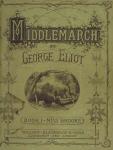
Middlemarch
by George Eliot
Dorothea Brooke is an idealistic, well-to-do young woman, engaged in schemes to help the lot of the local poor. She is seemingly set for a comfortable, idle life as the wife of neighbouring landowner Sir James Chettam, but to the dismay of her sister, Celia (who later marries Chettam), and of her loquacious uncle Mr. Brooke, she marries instead Edward Casaubon, a middle-aged pedantic scholar who, she believes, is engaged on a great work, The Key to All Mythologies. She wishes to find fulfilment through sharing her husband’s intellectual life, but during an unhappy honeymoon in Rome she experiences his coldness towards her ambitions. Slowly she realises that his great project is doomed to failure and her feelings for him descend to pity. She forms a warm friendship with a young cousin of Casaubon’s, Will Ladislaw, but her husband’s antipathy towards him is clear (partly based on his belief that Ladislaw is trying to seduce Dorothea in order to gain access to Casaubon's fortune) and Ladislaw is forbidden to visit. In poor health, Casaubon attempts to extract from Dorothea a promise that, should he die, she will "avoid doing what I should deprecate and apply yourself to do what I desire" — meaning either that she should shun Ladislaw, or, as Dorothea believes, that she will complete The Key to All Mythologies in his place. Before Dorothea can give her reply, Casaubon dies. She then learns that he has added the extraordinary provision to his will that, if she should marry Ladislaw, Dorothea will lose her inheritance from Casaubon.
Meanwhile, an idealistic young doctor, Tertius Lydgate, has arrived in Middlemarch, with advanced ideas for medical reform. His voluntary hospital work brings him into contact with the town’s financier, Mr. Bulstrode, who has philanthropic leanings, but who is also a religious zealot with a secret past. Bulstrode's niece is Rosamond Vincy, the mayor's daughter and the town's recognised beauty, who sets her sights on Lydgate, attracted by what she believes to be his aristocratic connections and his novelty. She wins him, but the disjunction between her self-centredness and his idealism ensures that their marriage is unhappy. Lydgate manages his financial affairs badly and he is soon deep in debt and has to seek help from Bulstrode. He is partly sustained emotionally in his marital and financial woes by his friendship with Camden Farebrother, the generous-spirited and engaging parson from a local parish.
At the same time we have become acquainted with Rosamond's university-educated, restless, and somewhat irresponsible brother, Fred, reluctantly destined for the Church. He is in love with his childhood sweetheart, Mary Garth, a sensible and forthright young woman, who will not accept him until he abandons the Church (which she knows he has no interest in) and settles in a more suitable career. Mary has been the unwitting cause of Fred’s loss of a considerable fortune, bequeathed to him by the aged and irascible Mr. Featherstone, then rescinded by a later will which Featherstone, on his death-bed, begs Mary to destroy. Mary, unaware of what is at stake, refuses to do so. Fred, in trouble over some injudicious horse-dealing, is forced to borrow from Mary’s father, Caleb Garth, to meet his commitments. This humiliation shocks Fred into a reassessment of his life and he resolves to train as a land agent under the forgiving Caleb.
These three interwoven narratives, with side-plots such as the disastrous though comedic attempt by Mr. Brooke to enter Parliament as a sponsor of Reform, are the basis of the story until it is well into its final third. Then a new thread emerges, with the appearance of John Raffles, who knows about Bulstrode’s past and is determined to exploit this knowledge. Bulstrode’s terror of public exposure as a hypocrite leads him to hasten the death of the mortally sick Raffles by giving him access to forbidden alcohol and excess amounts of opium. But he is too late; Raffles had already spread the word. Bulstrode’s disgrace engulfs the luckless Lydgate, as knowledge of the financier’s loan to the doctor becomes public, and he is assumed to be complicit with Bulstrode. Only Dorothea and Farebrother maintain faith in Lydgate, but Lydgate and Rosamond are threatened by the general opprobrium with the necessity of leaving Middlemarch. The disgraced and reviled Bulstrode’s only consolation is that his wife stands by him as he, too, faces exile.
The final thread in the complex weave concerns Ladislaw, who, since their initial meeting, has kept his love for Dorothea to himself. He has remained in Middlemarch, working for Mr. Brooke, and has also become a focus for Rosamond’s treacherous attentions. After Brooke’s election campaign collapses, there is nothing to keep Ladislaw and he visits Dorothea to make his farewell. But Dorothea, released from life with Casaubon, but still the prisoner of his will, now sees Ladislaw as the means of her escape to a new life. Renouncing her independence, and Casaubon's fortune, she shocks her family again, by announcing she will marry Ladislaw. At the same time Fred, who has proved an apt pupil in Caleb’s profession, finally wins the approval and hand of Mary.
Beyond the principal stories we are given constant glimpses into other scenes. We observe Featherstone’s avaricious relatives gathering for the spoils, visit Farebrother’s strange ménage, and become aware of enormous social and economic divides. But these are the backdrops for the main stories which, true to life, are left largely suspended, leaving a short finale to summarise the fortunes of our protagonists over the next thirty years or so. The book ends as it began, with Dorothea: "Her full nature [ . . . ] spent itself in channels which had no great name on the Earth. But the effect of her being on those around her was incalculably diffusive: for the growing good of the world is partly dependent on unhistoric acts."